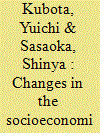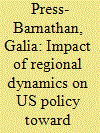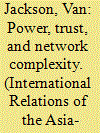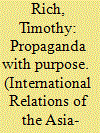| Srl | Item |
| 1 |
ID:
138100


|
|
|
|
|
| Summary/Abstract |
Why do citizens support democracy under an authoritarian regime that has been waging a protracted civil war? This paper explores the attitude toward democracy expressed by urbanites who were protected by the incumbent, by employing the AsiaBarometer survey data collected during the Nepali civil war. Our empirical finding is that citizens’ favorable attitude toward democracy is fostered by economic downturn and deterioration in security. In Nepal, civil war weakened relations between the capital’s residents and rural peasants as the rebels extended their influence in the countryside and shrank the urban economic sectors. Rebel infiltration into Kathmandu furthermore posed a great threat to the residents.
|
|
|
|
|
|
|
|
|
|
|
|
|
|
|
|
| 2 |
ID:
138102


|
|
|
|
|
| Summary/Abstract |
Why did Japan begin scientific whaling, a policy that benefits few domestically and alienates many around the world? In this essay, I argue that Japan’s scientific whaling regime was formed as a result of a ‘two-level game’ between President Reagan and Prime Minister Nakasone. Although Reagan was faced with a unified, anti-whaling Congress, he himself was not much concerned about the issue. Nakasone was also not particularly concerned about whaling, and he initially was faced with a Diet that was divided on how to deal with whaling (although it became less divided over time). Ultimately, these circumstances led Japan to develop the scientific whaling regime that persists to this day.
|
|
|
|
|
|
|
|
|
|
|
|
|
|
|
|
| 3 |
ID:
138099


|
|
|
|
|
| Summary/Abstract |
This paper examines American policy regarding regional security arrangements (RSAs) in Asia. It argues that it is American perceptions of regional interest in such RSAs and of the compatibility of the goals of regional partners with those of the United States, which eventually shape American policy. After discussing the potential value and cost of RSAs, it suggests that actual policy choices are shaped largely as a reaction to regional states’ motivations and policies. Since in Asia, there was limited functional pooling effect to be gained from RSAs, changes in American policies reflected much more a reaction to changes in regional interest in such arrangements. This interaction is demonstrated through a review of post-Cold War developments regarding US RSA policy, distinguishing between the early years of transition to unipolarity and the erosion of unipolarity since the late 1990s. These are also compared to earlier American policy regarding RSAs during the Cold War.
|
|
|
|
|
|
|
|
|
|
|
|
|
|
|
|
| 4 |
ID:
138098


|
|
|
|
|
| Summary/Abstract |
Why do hedging strategies appear so pervasive in Asia? This article argues that hedging – not balancing or bandwagoning – is the central tendency in Asian international relations, offering three different lenses for making sense of this phenomenon, focusing in particular on the third: power transition theory, mistrust under multipolarity, and complex networks. Each perspective highlights different factors that explain the incentives for Asian states to hedge, what hedging looks like, and how long hedging is likely to endure. Power transition theory tells us that hedging is the result of uncertainty about a possible power transition between the United States and China. Multipolarity points us to uncertainty about the intentions of a growing number of states. And the logic of complex networks explains hedging as a response to the topology of Asia’s complex network structure – consisting of sensitivity, fluidity, and heterarchy – which makes it difficult for Asian-foreign policy elites to assess the future consequences of present day commitments.
|
|
|
|
|
|
|
|
|
|
|
|
|
|
|
|
| 5 |
ID:
138101


|
|
|
|
|
| Summary/Abstract |
What explains patterns in North Korea’s own coverage of nuclear issues? The conventional wisdom assumes that North Korea focuses its attention on the United States and that changes in the administrations in the United States and South Korea influence such rhetoric, yet this remains largely untested. Content analysis using daily English news reports from the Korean Central News Agency from 1997 through 2012 provides an explicit base for how the regime attempts to frame nuclear issues for a foreign audience. References to the United States positively correlate with nuclear reference while findings regarding US and South Korean administrations conflict with the conventional wisdom. References to the Kims also negatively correlate with nuclear references with variation after Kim Jong Il’s death. More broadly this analysis suggests the possible leverage of analyzing North Korea’s own materials.
|
|
|
|
|
|
|
|
|
|
|
|
|
|
|
|